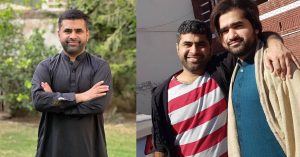YouTuber Aun Ali Khosa, who was allegedly abducted on August 15, 2024, has safely returned home, according to confirmations from his legal team on Monday.
His sudden disappearance had sparked concerns and legal actions, culminating in the Lahore High Court (LHC) mandating the Lahore police to ensure his recovery by August 20. Khosa’s return has been met with relief and gratitude from his family, legal representatives, and supporters, who had feared for his safety amidst allegations of unlawful detention.
The legal battle to secure Khosa’s release was marked by urgent petitions and court orders. On Friday, August 18, the LHC responded to a petition filed by Khosa’s wife, Binish Iqbal, who claimed that her husband was in the “unlawful and illegal custody of law enforcement authorities.” The court took immediate action, directing the Lahore police to recover Khosa by August 20, reflecting the seriousness of the situation and the concerns for his well-being.
Iqbal’s petition detailed the harrowing events of August 15, when a group of heavily armed men, including police officials and individuals in plain clothes with masked faces, allegedly broke into Khosa’s apartment in the early hours of the morning. The men reportedly confiscated his phone, laptop, computer system, and digital camera before taking him into custody. The petition emphasized the uncertainty surrounding Khosa’s whereabouts and the fear that he might have been a victim of enforced disappearance—a term used to describe instances where individuals are secretly abducted or detained by state authorities or groups without due legal process.
In the early hours of Monday, August 21, Khosa’s lawyer, Khadija Siddiqi, shared the news of his release on the social media platform X, formerly known as Twitter. “Alhamdulillah, Aun Ali Khosa has been released! He has reached home!” Siddiqi wrote, expressing relief at her client’s safe return. This message was soon followed by another confirmation from Mian Ali Ashfaq, another member of Khosa’s legal team, who also took to X to share the good news.
Ashfaq later provided additional details, stating that he had spoken to Khosa extensively following his release. “Alhamdulillah, he is courageous, safe, and determined,” Ashfaq said. He also took the opportunity to thank Siddiqi for her unwavering support and representation throughout the ordeal, highlighting the collective efforts of the legal team in securing Khosa’s release.
Aun Ali Khosa is a well-known digital content creator, writer, and comedian with a substantial following of 137,000 subscribers on YouTube. His content often includes satire and social commentary, which resonates with a wide audience in Pakistan. Prior to his abduction, Khosa had gained significant attention for his satirical song “Bill Bill Pakistan,” which went viral on social media. The song, which critiqued the rising electricity bills in Pakistan around Independence Day, struck a chord with many Pakistanis facing economic hardships and fueled further discussions on the topic.
The public’s reaction to Khosa’s alleged abduction was one of outrage and concern, particularly among his followers and fellow content creators. The incident raised alarms about the safety and freedom of expression for digital creators in Pakistan, where critical voices can sometimes face significant risks.
Khosa’s case highlights the ongoing concerns regarding enforced disappearances and the treatment of individuals who express dissenting opinions or engage in satire in Pakistan. The involvement of law enforcement authorities in such incidents, as alleged in Khosa’s case, underscores the need for greater accountability and transparency in the country’s legal and security apparatus.
The swift intervention by the Lahore High Court and the subsequent release of Khosa demonstrate the critical role that the judiciary can play in protecting citizens’ rights. The court’s order for Khosa’s recovery by a specific date indicates a commitment to upholding the rule of law and preventing unlawful detentions.
The incident also serves as a stark reminder of the challenges faced by those who use digital platforms to voice their opinions. The fear of reprisal, as seen in Khosa’s case, can have a chilling effect on freedom of expression, discouraging others from speaking out on important social and political issues.




